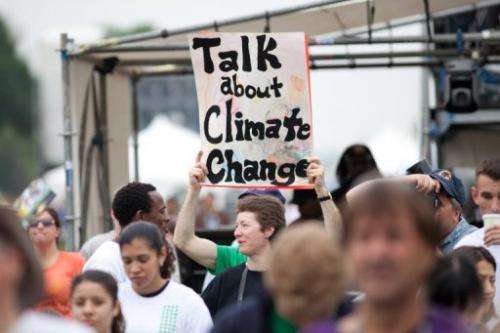People advocate for more attention for climate change at the climate rally on the National Mall on April 25, 2010 in Washington. Activists are stepping up pressure on US President Barack Obama to issue concrete plans to battle climate change, with a major rally planned in Washington following his annual address to Congress.
Activists are stepping up pressure on US President Barack Obama to issue concrete plans to battle climate change, with a major rally planned in Washington following his annual address to Congress.
More than 100 groups are planning what they hope will be the largest rally in the United States on climate change, with organizers saying that tens of thousands will descend on the National Mall Sunday with buses from 28 states.
The demonstration comes after the United States last year experienced record high temperatures, extensive drought and the devastation of superstorm Sandy which some have linked to changing climate patterns.
Advocacy groups urged Obama to lay out specific proposals Tuesday in his annual State of the Union speech. Obama spoke forcefully, albeit in general terms, on fighting climate change during his inaugural speech last month.
"We can no longer afford to wait to respond to the threat of climate change," said David Foster, executive director of the BlueGreen Alliance, a partnership of organized labor and environmental organizations.
"We can no longer wait to fix our nation's crumbling infrastructure. The systems we rely on every day are not prepared to deal with the impacts of these events," Foster told reporters on a conference call.
The BlueGreen Alliance and like-minded groups called for Obama to focus on measures including reducing carbon pollution from power plants, rebuilding the US water system and investing in alternative forms of transit.
Separately, the Center for Biological Diversity called for more ambitious steps, such as having the US Environmental Protection Agency (EPA) setting a national cap on pollution of greenhouse gases which are blamed for rising temperatures.
Obama has relied increasingly on executive authority in fighting climate change due to stiff resistance from the rival Republican Party, many of whose members question conclusions of mainstream scientists on greenhouse gases.
A proposal to set up a "cap-and-trade" system that restricts carbon emissions across the United States died in the Senate in 2010.
(c) 2013 AFP
























